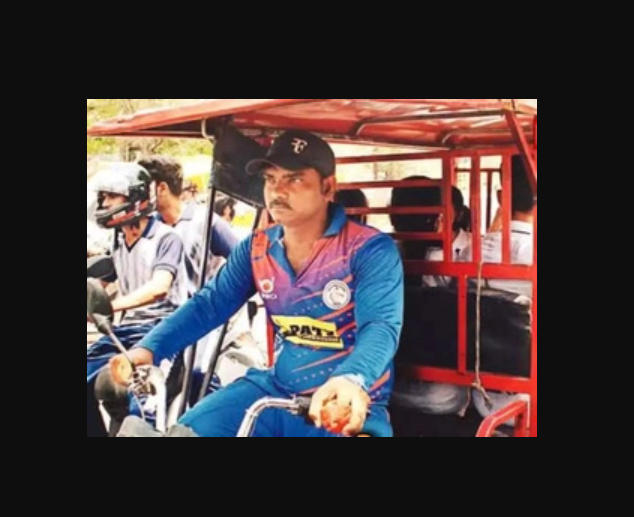Differently-abled cricketer Raja Babu, who scored a 20-ball 67 for Uttar Pradesh in a national-level tournament against Delhi in 2017, is now driving a e-rickshaw in Ghaziabad and selling milk to make ends meet.
Raja Babu, a differently-abled cricketer is now driving an e-rickshaw in Ghaziabad and selling milk to make ends meet.
The cricketer gained attention for his 67 runs in 20 balls against Delhi for Uttar Pradesh during the 2017 national competition.
Raja Babu received numerous accolades for his brisk 50-run performance in the Meerut competition “Hausalon ki Udaan,” and he was also given the assurance that he will be recognised for his efforts in the game.
Even better, a local businessman stepped up and gave the batsman an e-rickshaw, which Raja now uses to get by in Ghaziabad.
Unfortunately, the Covid-19 pandemic struck just as the left-handed batter was looking forward to greater success, thus ruining Raja’s cricketing career.
Due to the financial crisis, the Divyang Cricket Association (DCA), a nonprofit that assisted disabled cricketers in the state, ceased operations in 2020, leaving players like Raja on their own.
“It really broke our back. For the first few months, I sold milk on the streets of Ghaziabad and drove an e-rickshaw,” Raja told Navbharat Times.
“My teammates used to work as delivery agents and waiters at ‘Disabled Dhaba’ in Meerut during that time. It (DCA) was opened by Amit Sharma, the founder and coach of Dhaba Association,” he added.
To maintain his family of four, which includes his wife Nidhi (27) and children Krishna (7) and Shaanvi (2), Raja, 31, is currently running the gifted e-rickshaw on the streets of Ghaziabad and earning Rs 250–300 per day.
“I ply the e-rickshaw between Baharampur and Vijay Nagar for about 10 hours a day so that I can earn only Rs 250-300. I can barely meet the household expenses and there is nothing left for the education of children,” Raja revealed.
“There are hardly any employment opportunities for the differently-abled,” Raja grieved.
Moreover, due to DCA’s lack of affiliation with the Uttar Pradesh Cricket Association (UPCA), it never received recognition, and Amit Sharma was forced to shut it down when funding paused during the pandemic.
“We started the association with the help and donations from some local businessmen. Transport and food expenses were covered during the tournaments. The DCA was neither under the BCCI nor the UPCA, so the players did not have a fixed income. Whatever money he (Raja) got as man-of-the-match award was his salary. He had lost a leg in an accident,” said Sharma.
Still, Raja is optimistic that things will change.
“In 1997, while returning home from school, I lost my left leg in a train accident. At that time my father was a Grade IV employee in the Railways and was posted in Panki, Kanpur. After the accident, my studies came to a halt as the family could not pay the school fees. The accident changed my life but I did not stop dreaming,” said Raja.
Raja began playing street cricket at the age of 12 ( 3 years after the injury).
At the Aramina Ground in Kanpur, Raja began his training, and by the time he was 23 years old, he was competing in district-level competitions.
“In 2013, I played a few tournaments in Bijnor. At the same time, Sharma, who was then the DCA director, asked me to join the association. I got the best player award in Uttarakhand Divyang Cricket Tournament 2015. The next year I became the captain of the UP team.”
In 2014 Raja got married and had to move to UP’s Ghaziabad in search of a job.
“I started working in a shoe factory for Rs 200 a day. Money was necessary but it was becoming very difficult to balance cricket and factory work, so after six months I decided to leave the job and focus only on cricket.”
In 2016, he received numerous honours in UP and Gujarat. he was named “man of the match” in a competition on a nationwide scale. He was also honoured by the Bihar government in the same year.
“I got medals and respect but that was not enough to survive. In 2022, I started playing wheelchair cricket again for Madhya Pradesh but due to the pandemic, only a few matches could be played. We are also cricketers but during the pandemic we did not get any help from cricket organisations. We had to eat food on the streets distributed by some well-meaning people. When the lockdown was imposed, I had just Rs 3,000 in deposit. How many days will that last? I had to vacate the rented house twice as I had no money to pay rent.”
Atul Srivastava, UPCA (Divyang) chairperson, asked the financially robust Indian cricket board to take steps for the betterment of cricketers with disabilities.
“BCCI should also take steps in this direction so that the disabled cricketers can play without worrying about money and jobs,” said Srivastava, adding that in countries like Bangladesh, the expenses of disabled cricketers are borne by their cricket association.
As per reports, in April this year, the BCCI had given recognition to the Differently-abled Cricket Council of India (DCCI) to promote the sport amongst the differently-abled, deaf and wheelchair participants.
Article Credits: The Economic Times
